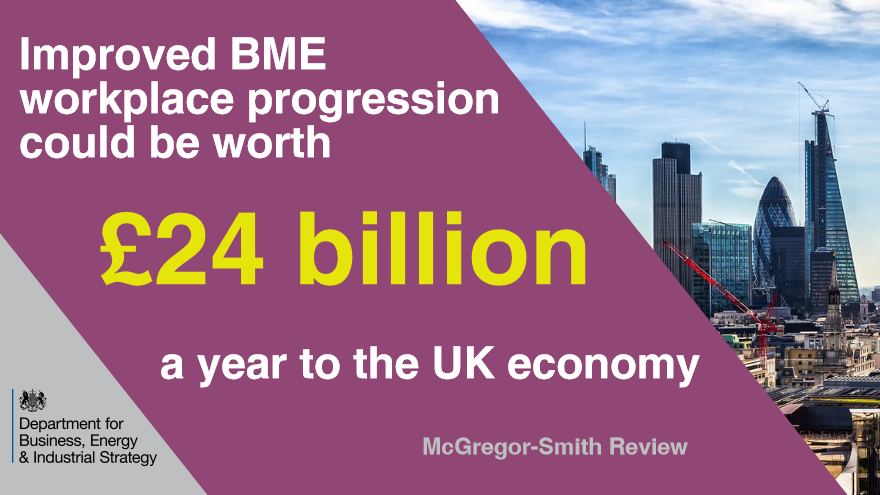This week The McGregor-Smith Review on race in the workplace was unveiled. The headline of the report is ‘The time for talking is over. Now is the time to act’ and I couldn’t agree more.
The Taylor Bennett Foundation is cited in the report (p27 & 42) as a best practice case study and it says “The Foundation is a model for how other industries can engage with the imperative of diversity and the challenge of recruitment.” Quite right too.
It’s been 10 years since the Foundation was launched. In 2007 it wasn’t a Foundation, it was a small diversity programme run alongside a recruitment business but it took on a life of its own and in 2013 we officially became a charity. Over 500 BAME graduates have benefited from attending our assessment days and received detailed feedback on their interviews. Nearly 200 graduates have been through the PR traineeship programme and our alumni now work in communications roles across a range of PR agencies and in-house comms teams.
We are a tiny, dedicated team with very few resources. In January I was on my hands and knees scrubbing the office kitchen floor and helping to put together new office furniture. Tomorrow I’m going to the PRCA’s PR Council meeting to give a speech on the work of the Foundation. All the TBF team wear many hats and get stuck in – there is no room to be precious when you work for a small charity.
It is incredible then that we have achieved so much with relatively little. We continue to improve our impact with the launch of our mentoring and university outreach schemes and are constantly striving to increase our reach to help more young people and make a real difference to the industry.
The launch of The McGregor-Smith Review, and my speaking engagement at the PRCA’s PR Council, have me thinking about how much work there is still to be done to improve ethnic diversity in PR.
In my experience when talking to heads of comms and agency heads there is an appetite in the PR industry to improve diversity but even those open to doing something about it struggle to know where to start. They should start with this: improving diversity does not just happen. It takes an investment of time and money to make a real impact. We have proved at the Foundation that it can be done – but it doesn’t come for free. You have to put your money where your mouth is.
The review covers why diversity is important and makes the business case for it. It also makes 26 recommendations on how to improve ethnic diversity in the workplace for employers and government – and some of those are particularly useful for the PR industry.
Some of those things most firms could implement today. Committing to more diverse interview panels, using diversity as a KPI, making sure job specifications use relevant language, offering work experience to more diverse groups and addressing unconscious bias are all recommendations that most companies could follow pretty easily.
I have a few recommendations of my own. These are very practical ways to start improving diversity and every single one of them is achievable:
1 – Advertise more widely. I often hear the argument that PR firms would hire more young BAME people but they don’t apply for the roles. My answer to that is, ‘where do you advertise?’ Quite often, particularly for well known firms, they don’t advertise at all. They are then relying on people who actively seek out their website to apply for positions – and so will only attract people who a) already know they exist b) consider PR an attractive career choice and c) know enough about the industry to know how to apply. That’s all well and good, and I understand the arguments that they want people who are proactively seeking PR roles and show a level of interest in their firm in particular, but in that case they are dismissing all the young people who may not have any knowledge of PR but absolutely have the potential to succeed in the industry – if only they knew it was there and what it offers. We get around 100 applications from BAME graduates for every Taylor Bennett Foundation PR Traineeship programme. If you think more creatively about where you recruit from, it is possible to find more diverse talent.
2 – Scrutinise your recruitment processes. If you use recruiters, insist that they provide you with more diverse short lists of candidates. Employ university blind and name blind recruitment. This BBC1 Inside Out programme should be enough to convince you of the merits of that. 100 applications sent out by ‘Adam’ and ‘Mohammed’ with exactly the same CV. Adam got offered three times as many interviews as Mohammed. It makes you think, doesn’t it? Once at interview stage, have more than one person conduct the interview to help eliminate unconscious bias.
3 – Think about workplace inclusion. Once you have more diverse staff that’s great and I applaud your efforts to improve things but you won’t keep those staff if there isn’t a concerted effort to be an inclusive workplace. That includes visible support of diversity at senior levels, formal or informal networks for more diverse groups, policies that support employees work-life balance and cultural sensitivity, and a diversity and inclusion champion at operational level.
4 – Don’t reinvent the wheel. There are programmes out there that offer you the opportunity to help improve diversity in your firm and in the industry as a whole and there are easy ways to support them. I am of course going to plug the Taylor Bennett Foundation here but you should also look at Creative Access, #BAME2020 and The Media Trust too as all of those organisations have offerings which can help.
In terms of the Foundation there are a number of really easy way to get involved:
– Host a visit or be a guest speaker
We send our PR trainees to as many different in-house comms teams and PR agencies as possible to give them a breadth of exposure to different comms disciplines and industries. A typical visit is about three hours and they would come as a group of six to meet someone fairly senior to talk about the organisation, someone reasonably junior to talk through what they do on a day-to-day basis and the group would be given some kind of task to do – typically brainstorming for a campaign, or devising a social angle for a client and so on. Visit hosts report that they enjoy meeting the trainees enormously and the vast majority of hosts to sign up to do it again. There’s a list of previous visit hosts on the bottom of this page on our website.
– Come along to our events
Our next event is a panel discussion on career progression for BAME PR practitioners in May at Weber Shandwick. It’s a fiver to attend and it’ll be a great opportunity to hear a diverse panel of speakers talk about the barriers to progression and how to address those – many of which are outlined in The McGregor-Smith Review.
– Sign up to the mentoring programme
We only train between 18 and 24 graduates on our traineeships each year. They are intensive and extremely effective but it’s a relatively small pool of talent and we have employers knocking on our doors looking to hire them. We’ve solved the problem of limited reach and a limited pool of graduates by launching our mentoring scheme. It costs £500 to sign up to cover our administration and management of the programme. It’s only been going a relatively short time but the feedback we’ve had from both mentors and mentees is that it’s incredibly worthwhile, rewarding and makes a real difference to the mentees’ lives.
If you only want to do one thing with the Foundation, I would urge you to sign up to the mentoring programme.
– Sign up to the outreach programme
We are working with universities to arrange speaking opportunities to raise the profile of PR as a career choice for more diverse groups of students and graduates. In order to do that, we need volunteer speakers to go to those universities and talk about what their jobs involve.
– Donate
We have minimal overheads but all our PR trainees are paid, we have a small number of staff and there are the back office costs that all charities incur. We would like to do more and increase our impact but are restricted by our resources. The financial sustainability of the Foundation is what keeps me up at night so if you have a pot of money for charities at work, please think about sending it our way. For individual donations you can give here.
Drop me an email if you’d like to chat about the work of the Foundation:







Warning: Declaration of Social_Walker_Comment::start_lvl(&$output, $depth, $args) should be compatible with Walker_Comment::start_lvl(&$output, $depth = 0, $args = Array) in /home/stimsons/public_html/wp-content/plugins/social/lib/social/walker/comment.phpon line 60
Warning: Declaration of Social_Walker_Comment::end_lvl(&$output, $depth, $args) should be compatible with Walker_Comment::end_lvl(&$output, $depth = 0, $args = Array) in /home/stimsons/public_html/wp-content/plugins/social/lib/social/walker/comment.phpon line 60
[…] written previously about practical steps that PR employers can take to address the lack of diversity in their organisations, and how addressing unconscious bias can be a first step in that process. I […]